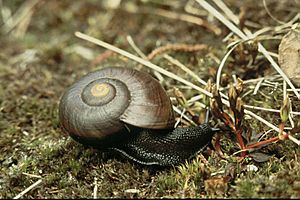Powelliphanta marchanti facts for kids
Quick facts for kids Powelliphanta marchanti |
|
|---|---|
 |
|
| Conservation status | |
| Scientific classification | |
| Kingdom: | |
| Phylum: | |
| Class: | |
| (unranked): |
clade Heterobranchia clade Euthyneura
clade Panpulmonata clade Eupulmonata clade Stylommatophora informal group Sigmurethra |
| Superfamily: |
Rhytidoidea
|
| Family: |
Rhytididae
|
| Genus: | |
| Species: |
P. marchanti
|
| Binomial name | |
| Powelliphanta marchanti (Powell, 1932)
|
|
Powelliphanta marchanti is a special type of land snail found only in New Zealand. It belongs to a group of large, meat-eating snails called Powelliphanta. These snails are known for their beautiful, shiny shells.
Contents
About Powelliphanta Snails
Powelliphanta snails are some of the biggest land snails in the world. They can grow quite large, with some shells reaching up to 9 centimeters (about 3.5 inches) across. Their shells come in many different colors and patterns, making each snail unique.
Where They Live
These amazing snails live in the damp, cool forests of New Zealand. They prefer places with lots of moss, leaf litter, and rotting logs. This environment helps keep them moist and provides good hunting grounds. They are often found hiding during the day and become active at night.
What They Eat
Unlike most snails that eat plants, Powelliphanta snails are carnivores, meaning they eat meat. Their favorite food is earthworms. They use their special mouthparts to suck up worms like spaghetti! They also eat slugs and other small creatures they find in the forest.
Life Cycle and Reproduction
Powelliphanta snails are hermaphrodites, which means each snail has both male and female reproductive parts. When two snails meet, they can both lay eggs. They lay their eggs in clutches (groups) of about 5 to 10 large, hard-shelled eggs. These eggs look a bit like small bird eggs. The eggs hatch after a few months, and tiny snails emerge.
Conservation Status
Powelliphanta marchanti is a very important part of New Zealand's wildlife. However, its numbers are shrinking. The New Zealand Department of Conservation has classified Powelliphanta marchanti as a species in "serious decline." This means it is at high risk of disappearing forever if we don't protect it.
Why They Are Endangered
Several things threaten these snails:
- Habitat Loss: Their forest homes are being cleared for farming or building.
- Predators: Introduced animals like possums, rats, pigs, and hedgehogs love to eat these snails.
- Human Activity: Sometimes, people accidentally harm them or collect their shells, which is against the law.
How We Can Help
Protecting Powelliphanta snails means protecting their forest homes. Efforts are being made to:
- Control predators in areas where the snails live.
- Protect and restore their forest habitats.
- Educate people about how special these snails are and why they need our help.
By understanding and protecting these unique creatures, we can help ensure they continue to thrive in New Zealand's forests for many years to come.
See also
 In Spanish: Powelliphanta marchantii para niños
In Spanish: Powelliphanta marchantii para niños
 | Delilah Pierce |
 | Gordon Parks |
 | Augusta Savage |
 | Charles Ethan Porter |


